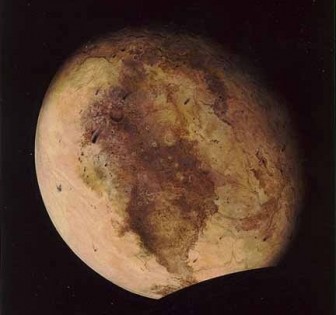
Our Pluto, discovered in 1930, is no longer a planet. Oh, it’s out there, all right, orbiting in the outermost sphere of our solar system. It is round. And yes, the committee of scientists that decides such things, the International Astronomical Union (IAU), decreed, in Prague in 2006, that to be a planet, an object in space must exert enough gravitational pull to make itself more or less round. No misshapen ice-rock chunk may be dubbed planet.
So our little Pluto is round. It’s about three-quarters as large as our moon. And it has its own moons, Charon (discovered 1978), and Nix and Hydra (discovered 2005). This is all very well known to the Plutophiliacs amongst us.
Pluto puts in a steady orbit around the sun (once every 248 years) and has faithfully done so since the beginning of our solar system. That’s another thing you must do to be called a planet—keep to your orbit around the sun. No digressions, deviations, or extracurricular excursions. You must “walk the line,” as Johnny Cash would say. Pluto walks the line (which is curved).
It’s cold on Pluto. It takes sunlight eight minutes to reach us and five hours to reach Pluto. But cold or not, Pluto is round, and it orbits the sun faithful as a dog. Arf! (Note to reader: I am trying to keep Pluto the Disney dog out of this. It’s not easy.)
Back to Pluto the planet. What caused the contentious and even raucous 2006 assembly of the IAU to vote to demote? For this was the fate of poor Pluto, erstwhile planet, now “dwarf planet.”
Well, you must exert enough gravitational pull to clear your immediate area of impostors and party crashers. Enter 2003 UB313, discovered (as its name would imply) in 2003, 27 percent bigger than Pluto, hovering in Pluto’s general neighborhood, though farther out. Pluto failed to clear 2003 UB313 from its neighborhood.
Furthermore, if Pluto is going to be a planet, then the quite round, quite regular, considerably bigger 2003 UB313 has got to be a planet, too. Indeed, this new “planet” had its own moment in the sun. But the same 2006 Prague assembly that demoted Pluto demoted 2003 UB313 as well. And named her Eris, for the Greek goddess of warfare and strife. Eris causes trouble. She did and she does.
All of which brings us to the following point. No matter how high your status in life, you can be demoted. You can be deprived of your former dignity. You can be denigrated, discarded, dismissed, dissed. You can go from Pluto, King of the Underworld, to plutoid.
But, after all, you have not changed. You are just as beautiful as before.

